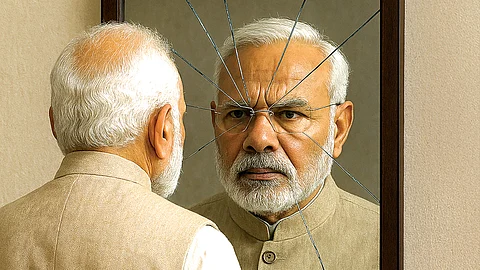

(This article was originally written by N. Pon Kumarakurubaran and appeared in Junior Vikatan, dated August 10, 2025.)
Delhi’s corridors of power are abuzz. A silent revolt is brewing. Whispers have turned into warnings. As Prime Minister Narendra Modi prepares to turn 75 this September, the Rashtriya Swayamsevak Sangh (RSS) — the ideological backbone of the Bharatiya Janata Party (BJP) — is no longer whispering. It’s sending signals, some subtle, some sharp. And the message is unmistakable: Modi’s unilateral dominance is under scrutiny, not only from the opposition, but from within his own ideological family.
“There is a mood in the party and the Sangh against Modi’s one-man show,” says a senior RSS functionary, echoing what many in Nagpur and Delhi have begun to privately concede. “Though he travelled the world, he could not muster support for India during crucial times. The image that was carefully built over a decade is slowly eroding.”
Indeed, there is evidence of this decline on multiple fronts—diplomatically, electorally, and ideologically.
Modi’s foreign policy narrative—one that projected him as a global statesman—is now under fire. Chinese aggression on the border continues unabated. Pakistan’s provocations have intensified, and India’s response has been subdued, if not silent. US President Donald Trump’s apparent indifference to India’s security concerns, including hosting Pakistan Army Chief General Asim Munir at the White House, went unanswered. The irony? Modi, who once trumpeted “56-inch chest” diplomacy, could not publicly condemn any of it.
The loss of moral high ground is stark: Pakistan, under global scanner for terrorism, was given the chair of the UN’s counter-terrorism forum—on Modi’s watch. The IMF’s billion-dollar assistance to Pakistan during India’s post-strike clampdown on terror camps has not gone unnoticed. “This is a clear failure of India’s foreign policy,” says a former senior IAS officer. “The silence is deafening. The RSS isn’t impressed, and neither are the armed forces.”
Last month, RSS chief Mohan Bhagwat made a seemingly casual remark at a book launch:
“Once you reach 75, you should step aside and make way for newcomers... Bingley used to joke, ‘If you’re wearing a shawl at 75, it’s time to retire.’”
The political implications were explosive. Modi turns 75 on September 17. Though BJP leaders rushed to clarify that Bhagwat’s statement was not aimed at the Prime Minister, the political climate in Delhi suggests otherwise.
“The cold war between Modi and the Sangh is no longer cold,” says a senior BJP leader. “It’s a full-blown confrontation now.”
This isn't new. The seeds were sown in 2014 when Modi, immediately after becoming Prime Minister, formed the Margdarshak Mandal, a symbolic move to sideline stalwarts like Atal Bihari Vajpayee, L.K. Advani and Murli Manohar Joshi by placing them in an advisory body with no real power.
Since then, Modi and Amit Shah have gradually engineered a new power ecosystem—loyalists in key posts, RSS functionaries marginalised, and institutions reshaped to suit centralized control.
Post the 2019 landslide victory, the Modi-Shah duo took complete control. The Cabinet was packed with technocrats, retired bureaucrats, and trusted loyalists—Hardeep Singh Puri, R.K. Singh, Smriti Irani, S. Jaishankar, and Ashwini Vaishnaw—while seasoned RSS-aligned leaders like Ram Madhav were sidelined.
The Sangh’s foundational ideology—“Nation first, party second, individual last”—was flipped on its head. What emerged instead was “Modi first, Modi second, Modi last.”
In 2022, a deep rift emerged in Uttar Pradesh. Home Minister Amit Shah fielded candidates of his choice in 37 of the 80 constituencies, excluding Chief Minister Yogi Adityanath from key campaign meetings. The result? BJP won just 33 seats in UP—its worst performance in a decade. Modi’s own seat saw a scare during the early rounds of counting.
The post-2024 scenario is grim. BJP, banking on “Modi’s Guarantee”, failed to secure a majority. The Prime Minister now leads a coalition government—an outcome considered unthinkable just a year ago.
More importantly, RSS is no longer willing to remain a silent spectator. The Sangh's top brass has opposed the extension plans of current national president JP Nadda and are resisting efforts by the Modi-Shah combine to install another handpicked leader like Dharmendra Pradhan or Bhupender Yadav.
"The RSS has made it clear—this is not Modi’s personal party," says a Delhi-based BJP insider. “That slogan ‘retire at 75’ was not casual. It was coded rebellion.”
Interestingly, Bhagwat himself turns 75 on September 11. If he steps down voluntarily, it will create moral pressure on Modi to do the same. The Sangh is preparing the ground. Recently, sidelined leader Ram Madhav was reappointed as in-charge of Jammu & Kashmir—a symbolic power reclaiming gesture. Names like Nitin Gadkari, Devendra Fadnavis and Shivraj Singh Chouhan are now being considered as future national leaders with RSS approval.
The goal is clear: reassert ideological and organisational control over a party that has, in recent years, revolved around one man’s charisma.
But Modi isn’t backing down. If anything, insiders say he is preparing for 2029—and possibly transitioning India to a Presidential system. His recent moves hint at an ambition to craft a new political structure that transcends even the BJP.
“He won’t step aside at 75. He’s planning for the next 10 years,” says a former Union Minister. “But the Sangh thinks if they don’t stop him now, they never will.”
The Sangh believes its ideological DNA and future depend on reclaiming the party. Modi believes his popularity and control over the machinery can override internal opposition. Both are betting big. Only one can win.
As September nears, India isn’t just waiting for another political appointment. It's watching the unraveling of a carefully managed political narrative, with stakes that extend far beyond a birthday or a party post.
Will the RSS succeed in reminding BJP of its roots?
Or will Modi outmaneuver them again and rewrite India’s political destiny—on his own terms?
One thing is clear: The quiet war within the right wing is no longer quiet. It is the storm that could change everything.